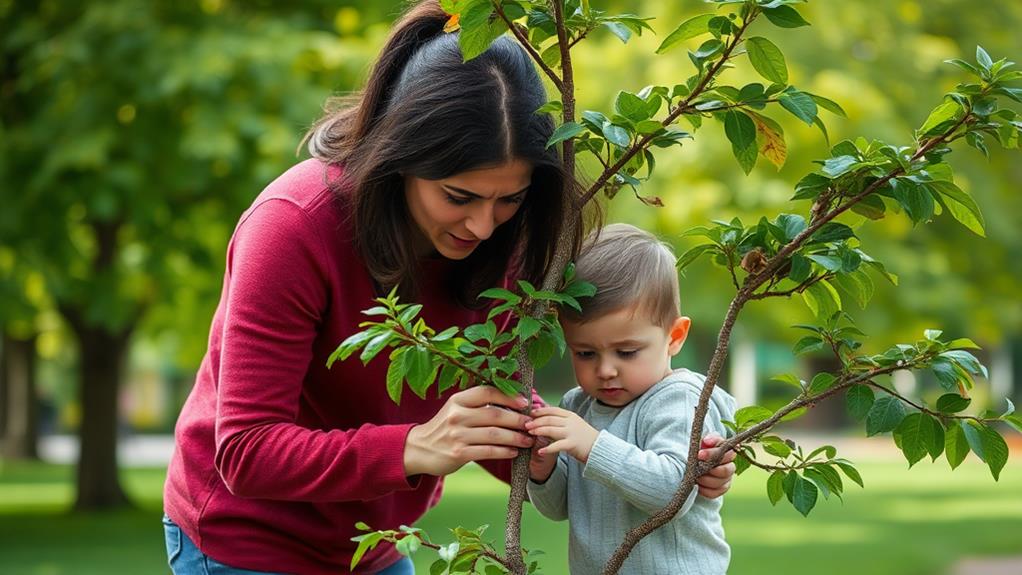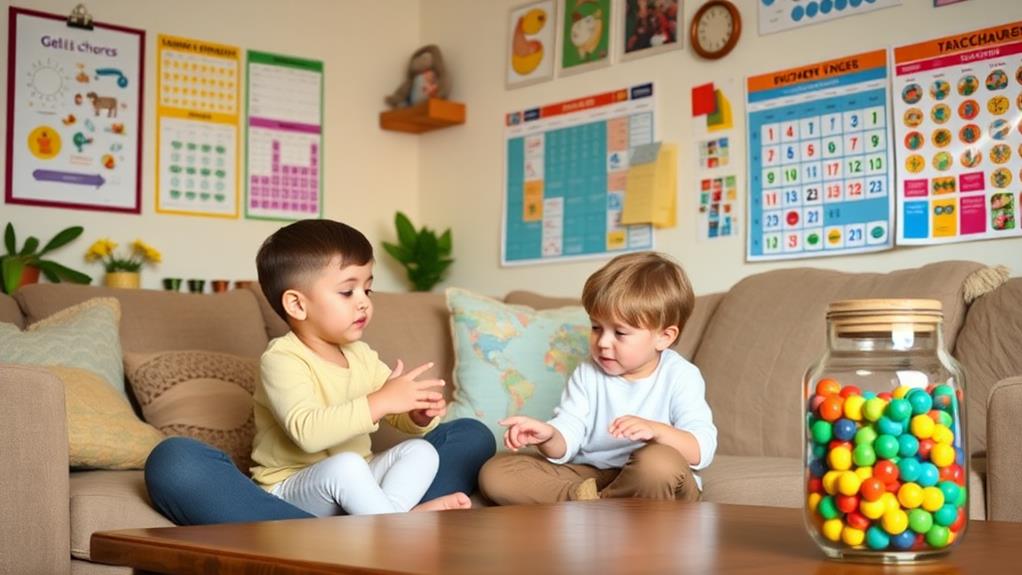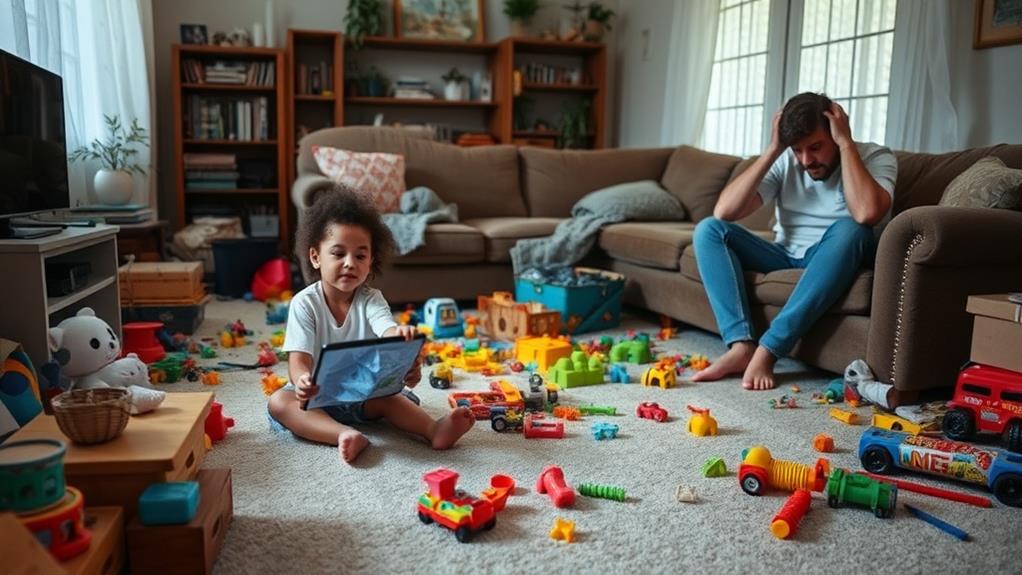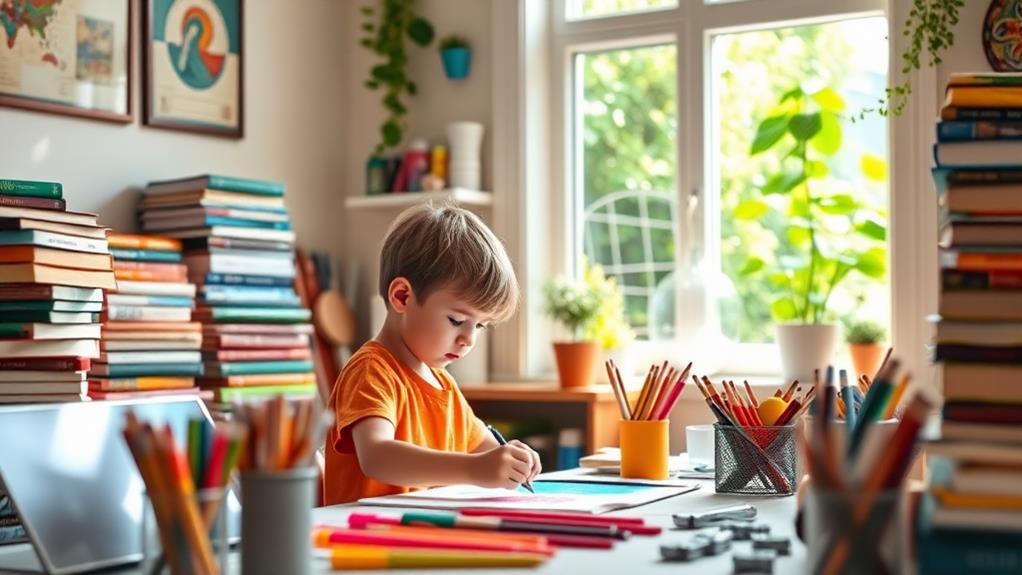You might not realize how certain parenting habits can inadvertently prevent your kids from taking responsibility for their actions. Over-protection and constant intervention can create a safety net that, while comforting, often stifles your child's independence and problem-solving skills. When children aren't allowed to face natural consequences, they miss out on vital lessons in accountability. This raises the question: how do we strike a balance between guidance and letting them learn from their mistakes? Understanding this dynamic could reshape your approach and foster a more resilient mindset in your children.
Over-Protection and Its Effects

Often, over-protection can significantly hinder a child's development of independence. When parents step in too much, kids miss out on important lessons. You know, the ones that help them learn to take responsibility for their actions.
If you're always swooping in to save the day, your child mightn't face the natural consequences of their choices, and that can lead to anxiety and dependency.
Imagine a kid who's never allowed to make mistakes. They might struggle later in life because they never had the chance to adapt to challenges. It's like a bird never learning to fly because it's kept in a cozy cage.
A balanced approach can help your child become more resilient.
The Role of Boundaries
How can boundaries shape a child's sense of responsibility? Well, think of boundaries like the rules of a game. They help set clear expectations, like curfews and house rules, so kids know what's expected of them.
When you establish non-negotiable boundaries, you create a safe space where children can learn from their choices, including the natural consequences that come with them, like when they forget to do their chores and face the music.
Boundaries also prevent over-scheduling and too much parental involvement. This way, kids have the chance to make decisions on their own, which is super important for developing essential life skills.
Plus, research shows that when parents stay consistent with their boundaries, it builds resilience in kids.
When you set appropriate boundaries, children take on age-appropriate responsibilities, which is crucial for their growth into accountable adults.
So, while it might feel easier to step in and save the day, remember, letting them navigate their boundaries can help them grow into responsible individuals.
After all, nobody wants a 30-year-old who still can't remember to take out the trash!
Teaching Accountability Early

Teaching accountability to kids starts with giving them a voice. When you encourage them to express their ideas and feelings about responsibilities, they begin to take care of their actions. It's like giving them a mini superpower!
Allowing kids to face the natural consequences of their choices—like finishing homework or, oops, forgetting it—helps them learn important lessons about responsibility every day.
Research shows that when kids accept responsibility for their mistakes, they become more resilient and better problem solvers as they grow up. So, it's essential to model positive communication about mistakes. Instead of seeing challenges as failures, teach them to view them as chances to grow.
Establishing clear expectations and consistent consequences helps reinforce the idea that accountability is crucial. You're setting them up for success, even if it feels tough sometimes. Remember, it's all part of the journey!
When kids learn to accept responsibility early on, they're more likely to navigate life with confidence and grace. So, next time they mess up, remind them it's just another chance to learn and grow!
Communication Styles Matter
While many factors contribute to a child's ability to accept responsibility, the way we communicate with them plays a crucial role. If you want your kids to take responsibility, think about your communication styles.
Using a calm and gentle tone during discussions can create a safe space for them. When children feel supported, they're more likely to express their feelings and own up to their mistakes without worrying about harsh judgment.
Open and respectful conversations help reduce defensiveness. This way, mistakes aren't seen as failures but as chances to grow. It's like turning a stumble into a dance move!
Active listening is important, too. When you validate your child's feelings, you boost their emotional intelligence, which is key for taking responsibility.
Try engaging in role-playing scenarios where they practice giving and receiving constructive feedback. It's a fun way to learn and can make a big difference in how they communicate.
Impact of Blame Dynamics

Blame dynamics can create a toxic environment that stifles a child's growth and accountability. When parents often shift blame to teachers or friends, kids might start to think it's okay to avoid responsibility for their actions. Instead of learning how to solve problems, they might just make excuses. This can lead to a victim mentality, where your child feels that they're always wronged, rather than seeing how they can improve.
Research shows that if you label your child as a victim too often, it lowers expectations for their behavior. This can make them more dependent as they grow up. When children attribute their failures to external factors, they miss out on valuable lessons about facing consequences.
Think about it—if they never own up to their mistakes, how will they learn to be accountable?
To help your child develop responsibility, it's important to create a culture at home that encourages them to own their mistakes. By doing this, you're not just helping them grow; you're preparing them to handle challenges with resilience and confidence.
After all, a little accountability goes a long way!
Encouraging Independence Through Consequences
From an early age, allowing kids to experience the natural consequences of their actions can significantly foster their sense of responsibility.
When you teach your child about the importance of handling their own responsibilities, like turning in homework, you're setting the stage for them to learn valuable life lessons. If they forget a homework assignment, let them face the consequences, like a lower grade. It might sting a bit, but that's how they'll learn!
When you step back and let them deal with the fallout, they start to think critically about their decisions. They'll weigh the outcomes of their choices and realize that every action has a reaction.
Plus, kids who face consequences become more resilient and better problem-solvers. They'll learn to navigate challenges without leaning too much on adult support.
Building Emotional Intelligence in Children

Teaching kids to handle their responsibilities naturally leads to another vital skill: emotional intelligence. When children learn to recognize and manage their emotions, they're not just working harder; they're building a solid foundation for their mental health and relationships. Understanding feelings helps kids connect with others, making it easier to share their thoughts and experiences.
Every kid makes mistakes—that's how they learn! Encouraging them to express their feelings in appropriate ways teaches them coping mechanisms to bounce back from challenges. You can boost their emotional intelligence by engaging in activities like role-playing or discussing different perspectives. This fosters empathy and helps them relate to others better.
As a parent, you can model emotional intelligence too! Show them how you manage your feelings and communicate positively about emotions. When they see you handling tough situations calmly, they're more likely to follow your lead.


